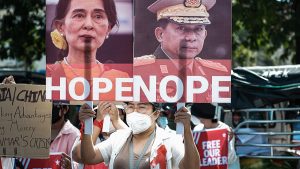On April 12, Dr. Maw Maw Oo, a senior Emergency Medicine doctor, was forcibly abducted by armed soldiers at his office at Yangon General Hospital. Maw Maw Oo, who was coordinating his hospital’s COVID-19 vaccination and treatment efforts, is just one of dozens of physicians to have been arrested by Myanmar security forces since widespread protests began in the country three months ago. Since February 11, at least 109 attacks and threats against health workers, facilities, and transports have reportedly been perpetrated in Myanmar, according to an analysis based on open-source reports conducted by Insecurity Insight, Physicians for Human Rights (PHR), and the Johns Hopkins University Center for Public Health and Human Rights (CPHHR). During this period, at least 97 healthcare workers have been arrested, 32 injured, and 10 killed. These targeted and deliberate attacks on healthcare workers, many of them treating injured protesters, represents a systemic pattern of abuse by the Myanmar military.
The violence began when the Myanmar military, or Tatmadaw, staged a coup d’etat by arresting Aung San Suu Kyi and other democratically elected leaders of the civilian government on February 1. This provoked a wave of nonviolent protests throughout the country in defense of Myanmar’s young democracy. Led by doctors and other leaders of civil society, the Civil Disobedience Movement (CDM) has spread throughout the nation. “Our duty as doctors is to prioritize care for our patients – but how can we do this under an unlawful, undemocratic, and oppressive military system?” Myanmar’s health leaders wrote recently in the Lancet.
The Tatmadaw has responded to the peaceful protest movement with violence and stunning cruelty. Hundreds of civilians engaged in nonviolent protest have been killed, including children. Healthcare professionals have been targeted, many while treating injured protesters. Hospitals throughout the country have been violently raided and occupied by soldiers, seeking to arrest healthcare workers affiliated with the CDM movement. Doctors are routinely detained for treating injured protesters and ambulances are targeted and shot as they respond to injured protesters. In the past month, the Tatmadaw has issued arrest warrants for over 200 physicians for their participation in the CDM, accusing them of “threatening the stability of the government.” In the midst of a global pandemic, hundreds of healthcare workers are in hiding, and underground clinics have popped up throughout the country to treat civilians. “Is it a crime for doctors and nurses to save patients’ lives?” one Myanmar physician wrote on her Facebook account.
It is not a crime. An attack on healthcare workers, especially those delivering aid, is a grave violation of international law. The Geneva Conventions, born out of the horrors of the Second World War, explicitly ban the targeting of healthcare workers. But these protections are faltering. The past several decades has seen health workers and infrastructure increasingly come under deliberate attack. Before Myanmar, Syrian hospitals and medical personnel offering healthcare in opposition-held areas were deliberately targeted by Russian and Syrian regime forces. These attacks led to the deaths of over 900 medical personnel, according to Physicians for Human Rights. In response to these attacks, the United Nations passed Resolution 2286 in 2016. This resolution urges the Secretary-General to take proactive steps to prevent attacks, including the potential deployment of U.N. peacekeeping forces to ensure the protection of healthcare.
The assault on healthcare in Myanmar has grave implications for public health. These attacks come in the context of a global pandemic which has already strained a fractured healthcare system. Nearly all COVID-19 testing and treatment has ceased, and it is unclear how the country will vaccinate its population when its healthcare workers are in hiding and the targets of violence. With much of its healthcare workforce on the run, it is likely the virus will continue to spread unchecked throughout Myanmar.
This deliberate targeting of healthcare workers in Myanmar can no longer be ignored by their medical colleagues across the globe. As the CDM’s official Twitter account tweeted recently, “The lack of outrage from [the] global medical community is … disheartening. Perhaps they have no idea.” The global medical community cannot afford to be silent. To paraphrase Martin Luther King Jr., an attack on healthcare anywhere is an attack on healthcare everywhere. The longer the international community remains silent and fails to enforce international law, the greater the risk that these attacks on healthcare become normalized in conflict.
The international community must do more than deliver forceful statements and rattle sabers. The U.N. must finally embrace a full implementation of Security Council Resolution 2286 and begin an impartial investigation into attacks on healthcare in Myanmar. The Security Council must consider the deployment of a U.N. peacekeeping force in Myanmar to protect the delivery of healthcare. This is an intervention which must be carefully considered, but Myanmar civilians have been calling for forceful intervention from the international community since the protests began. In 2005, the U.N. committed to a “responsibility to protect” civilians from crimes against humanity inflicted upon them by their governments. If the concept of medical neutrality is to be preserved for future generations, this responsibility must be taken seriously.
The Facebook biography of Dr. Thiha Tin Tun, a physician killed by Myanmar security forces on March 27, simply reads, “Darkest places in hell are reserved for those who maintain their neutrality in times of moral crisis.” The international community must not condemn ourselves in this moral crisis by remaining silent.

































